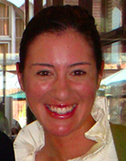Part 2 of 2 featuring Council Trainee Candidates
Morgan Locy, University of Alabama at Birmingham
 |
| Morgan Locy |
As a future physician-scientist, my primary research goals revolve around the idea of utilizing redox biology to translate into medical therapies. I do not have a determined path of what my clinical specialty will be; however, I am a firm believer that aberrations in redox biology underlie pathophysiology of most, if not all, disease states. Therefore, upon determining my clinical interests I will be able to apply redox biology as the central component of my chosen research. I am currently studying the effects that redox biology has on the pathophysiology of pulmonary fibrosis.
 |
| Laura Corrales-Diaz Pomatto |
Laura Corrales-Diaz Pomatto, University of Southern California
Our lab focuses upon oxidative stress and adaptation, in particular the 20S proteasome and the mitochondrial Lon protease. My research focus is centered upon understanding how the adaptive response of both these proteases change with age in the model organism Drosophila melanogaster. In both instances, the ability of D. melanogaster to adapt is robust in young females, but declines with age. I am currently exploring methods of potential ways to restore adaptive capacity in the aged fruit-fly.
 |
| David Schnel |
David Schnell, University of Kentucky
Approximately 90 years ago, Otto Warburg observed an increase in glycolysis among amply oxygenated tumor cells and introduced the concept of aerobic glycolysis to the field of cancer metabolism. However, after near a century of research, the underlying causes of aerobic glycolysis are yet to be understood. My research investigates the origins of aerobic glycolysis through the lens of MnSOD deficiency, common in many early cancers. I am teasing apart the metabolic responses to decreased MnSOD through stable isotope resolved metabolomics (SIRM) and building a bridge from redox environment to the origins of the Warburg effect.
 |
| Phillip Wages |
Phillip Wages, University of North California
I am interested in mechanistic toxicology within the scope of how environmental exposures impact human health. Through my work I have seen a broad underutilization of redox biology in many toxicology studies, and because of this I have a strong interest to integrate these two fields better. I am currently driven to understand the role of hydrogen peroxide and protein sulfenylation in air pollutant-induced perturbations of cellular signaling. However, I plan to dedicate my future efforts to the broader field of redox proteomics by identifying novel redox proteins and assess their potential role in pathophysiology.
SfRBM Members can click here to take part in the Trainee Council Elections
— Published
Category: SfRBM Member Profile